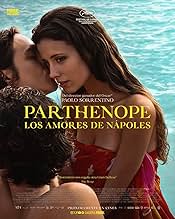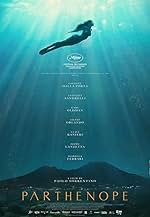Parthenope
- 2024
- Tous publics
- 2h 17min
Naples 1950. Une jeune fille américaine débarque au port après avoir reçu une lettre inattendue.Naples 1950. Une jeune fille américaine débarque au port après avoir reçu une lettre inattendue.Naples 1950. Une jeune fille américaine débarque au port après avoir reçu une lettre inattendue.
- Réalisation
- Scénario
- Casting principal
- Récompenses
- 7 victoires et 25 nominations au total
Antonio Annina
- Raimondo 10 anni
- (as Antonino Annina)
Maria Rosaria Bozzon
- Vecchia megera
- (as Mariarosaria Bozzon)
Résumé
Reviewers say 'Parthenope' by Paolo Sorrentino is visually stunning with breathtaking cinematography and beautiful Naples scenery. It explores themes of beauty, youth, love, and self-discovery. Celeste Dalla Porta's performance is praised for its allure and enigmatic quality. However, the film has mixed reviews, with some finding it pretentious and lacking substance, focusing too much on aesthetics. The narrative structure and character development are contentious, with some appreciating the philosophical approach and others finding it incoherent and shallow.
Avis à la une
"As complete as she is-with all her goods and her ills-do you know who she reminds me of?... Naples"
"The most beautiful gift is not the most expensive; it is the most fragile." Marques Rebelo, O Trapicheiro.
As the lights of the nineteenth century faded, Eça de Queirós-the great Eça-painted, through the face of Gonçalo Mendes Ramires, a symbolic portrait of Portugal that, as any good symbol does, contained everything, even when it sometimes seemed to contain nothing at all. Last year, Paolo Sorrentino, the great artist of contemporary cinema, painted with the face and body of Parthenope the symbolic portrait of Naples: yet another of his masterpieces, unveiling a city and a woman that, in the blink of an eye, are one in the lyrical conception of poet Sorrentino. Naples, or Parthenope- a name that evokes the mythological siren whose body is said to have given birth to the city-is not merely a backdrop, but a pulsating character. And Parthenope, the protagonist (portrayed with an ethereal melancholy), is its incarnation: born in the waters of the Mediterranean, like Venus, like Naples, she carries within her the contradiction of the sublime and the grotesque, of desire and death.
Sorrentino, heir to a Fellini-esque sensitivity for both beauty and the bizarre, does not fear excess. In scenes such as the party in Capri-where beautiful faces and bodies dissolved under golden lights-Parthenope, in her melancholy, asks her millionaire admirer: "Lei non pensa che il desiderio sia un mistero e il sesso il suo funerale?" [don't you think that desire is a mystery and sex its funeral]. The phrase echoes like an epitaph, laid bare to reveal the fragility and preciousness of desire and youth: desire as an unfathomable mystery, and sex as the funeral ritual of something that will never be consummated. It is in this interplay of opposites that the narrative unfolds, between the sculptural beauty of Naples' landscapes and the harshness of its forgotten alleys, where the protagonist walks with Roberto, an ambiguous character who unveils to her the other side of the city-a Naples both raw and poetic, where the contrast between the opulent luxury of grand houses and the simplicity of neglected corners becomes a metaphor for the city's inherent duality. Every step, every exchanged glance, carries the tension between the ephemeral and the eternal, between the urgent and the trivial. There, in the interplay of shadow and light, "the irrelevant merges with the decisive," as if chance itself became the silent arbiter of destinies. But is there any sense in speaking of chance? In song, Riccardo Cocciante tells us otherwise-everything was already foreseen.
"Beauty is like war: it opens doors," declares the alcoholic writer John Cheever (portrayed by Gary Oldman) in his brief, ghostly appearance. Drunkenly, he murmurs about the "scent of dead loves," a fragrance he claims to detect in his hotel room, surrounded by bottles of alcohol. So many dead loves in the city, in Parthenope's life. Here, her beauty is a weapon-a weapon that invariably wounds those who wield it: capable of granting access to privileged worlds, yet also imprisoning one in gilded cages. But Parthenope is a woman-city that "sfugge sempre": she flees, escapes, refuses to be deciphered, and always has a retort ready to disarm her interlocutors. What mysteries lie hidden within her?
The narrative delves into a universe where every image is meticulously sculpted to reveal the mysteries of existence. Amid this tapestry of contrasts stands Cardinal Tesorone, with his imposing and perverse figure, his grotesque nature and skepticism-a link in a Neapolitan religiosity divided between the sacred and the profane. His discourse, laden with solemnity and irony, resonates in the scene where, clad only in the adornments of San Gennaro's treasure, he attempts to seduce the city of Parthenope-or perhaps merely the delectable Parthenope herself-with the lubricity of a faun and the cynicism of an old man. Il tempo che scorre insieme al dolore.
In every dialogue, in every exchanged glance, the question echoes: is it possible that by trying to master desire, love ultimately imprisons its own freedom? And in this eternal ebb and flow between wanting and being, the protagonist remains undefinable, always escaping, constantly reinventing herself-as if the very city of Naples refused to be confined by labels or predetermined destinies.
In the twilight of her existence-be it amidst the effervescence of a Capri celebration or in the solitude of a dim alley-Parthenope presents herself as the synthesis of all the opposites that coexist in Naples: the sublime and the grotesque, desire and death, fragility and strength. It is this paradoxical combination that renders her portrait so unforgettable-a mirror, perhaps, of a city whose soul, despite everything, continues to pulse with an indomitable vitality, defying time and destiny with an irony that, in the end, remains its sole certainty.
- Eça de Queirós, The Illustrious House of Ramires, mutatis mutandis.
"The most beautiful gift is not the most expensive; it is the most fragile." Marques Rebelo, O Trapicheiro.
As the lights of the nineteenth century faded, Eça de Queirós-the great Eça-painted, through the face of Gonçalo Mendes Ramires, a symbolic portrait of Portugal that, as any good symbol does, contained everything, even when it sometimes seemed to contain nothing at all. Last year, Paolo Sorrentino, the great artist of contemporary cinema, painted with the face and body of Parthenope the symbolic portrait of Naples: yet another of his masterpieces, unveiling a city and a woman that, in the blink of an eye, are one in the lyrical conception of poet Sorrentino. Naples, or Parthenope- a name that evokes the mythological siren whose body is said to have given birth to the city-is not merely a backdrop, but a pulsating character. And Parthenope, the protagonist (portrayed with an ethereal melancholy), is its incarnation: born in the waters of the Mediterranean, like Venus, like Naples, she carries within her the contradiction of the sublime and the grotesque, of desire and death.
Sorrentino, heir to a Fellini-esque sensitivity for both beauty and the bizarre, does not fear excess. In scenes such as the party in Capri-where beautiful faces and bodies dissolved under golden lights-Parthenope, in her melancholy, asks her millionaire admirer: "Lei non pensa che il desiderio sia un mistero e il sesso il suo funerale?" [don't you think that desire is a mystery and sex its funeral]. The phrase echoes like an epitaph, laid bare to reveal the fragility and preciousness of desire and youth: desire as an unfathomable mystery, and sex as the funeral ritual of something that will never be consummated. It is in this interplay of opposites that the narrative unfolds, between the sculptural beauty of Naples' landscapes and the harshness of its forgotten alleys, where the protagonist walks with Roberto, an ambiguous character who unveils to her the other side of the city-a Naples both raw and poetic, where the contrast between the opulent luxury of grand houses and the simplicity of neglected corners becomes a metaphor for the city's inherent duality. Every step, every exchanged glance, carries the tension between the ephemeral and the eternal, between the urgent and the trivial. There, in the interplay of shadow and light, "the irrelevant merges with the decisive," as if chance itself became the silent arbiter of destinies. But is there any sense in speaking of chance? In song, Riccardo Cocciante tells us otherwise-everything was already foreseen.
"Beauty is like war: it opens doors," declares the alcoholic writer John Cheever (portrayed by Gary Oldman) in his brief, ghostly appearance. Drunkenly, he murmurs about the "scent of dead loves," a fragrance he claims to detect in his hotel room, surrounded by bottles of alcohol. So many dead loves in the city, in Parthenope's life. Here, her beauty is a weapon-a weapon that invariably wounds those who wield it: capable of granting access to privileged worlds, yet also imprisoning one in gilded cages. But Parthenope is a woman-city that "sfugge sempre": she flees, escapes, refuses to be deciphered, and always has a retort ready to disarm her interlocutors. What mysteries lie hidden within her?
The narrative delves into a universe where every image is meticulously sculpted to reveal the mysteries of existence. Amid this tapestry of contrasts stands Cardinal Tesorone, with his imposing and perverse figure, his grotesque nature and skepticism-a link in a Neapolitan religiosity divided between the sacred and the profane. His discourse, laden with solemnity and irony, resonates in the scene where, clad only in the adornments of San Gennaro's treasure, he attempts to seduce the city of Parthenope-or perhaps merely the delectable Parthenope herself-with the lubricity of a faun and the cynicism of an old man. Il tempo che scorre insieme al dolore.
In every dialogue, in every exchanged glance, the question echoes: is it possible that by trying to master desire, love ultimately imprisons its own freedom? And in this eternal ebb and flow between wanting and being, the protagonist remains undefinable, always escaping, constantly reinventing herself-as if the very city of Naples refused to be confined by labels or predetermined destinies.
In the twilight of her existence-be it amidst the effervescence of a Capri celebration or in the solitude of a dim alley-Parthenope presents herself as the synthesis of all the opposites that coexist in Naples: the sublime and the grotesque, desire and death, fragility and strength. It is this paradoxical combination that renders her portrait so unforgettable-a mirror, perhaps, of a city whose soul, despite everything, continues to pulse with an indomitable vitality, defying time and destiny with an irony that, in the end, remains its sole certainty.
Along the lines of the legendary beauty Aphrodite, "Parthenope" (Celeste Dalla Porta) was born in the sea and grew to become a great temptress to both of her male contemporaries. The first being her obsessed brother "Raimondo" (Daniele Rienzo) and the other her adoring childhood friend "Sandrino" (Dario Alta) whose unrequited love for her drove him to distraction. Not, however, to such distraction as that of her sibling, It's when the trio decide to head for an unfunded trip from their home in Naples to the nearby island of Capri that she meets elderly American writer/dipso "Cheever" (Gary Oldman) who finds her intriguing but appears to have a certain immunity to her charms and she's not used to that. Whilst on this carefree trip there befalls a tragic realisation that causes all of them to appreciate the stark realities and fickle shallowness of their lives and brings into focus senses of grief, rejection and emptiness. It's a beautifully photographed piece of cinema, this film, with sparing dialogue and a sexually, but not explicitly so, charged chemistry abundant throughout this rather visually extravagant but disappointingly soulless drama. It is a bit like a postcard upon which is a beautiful picture but just too few words to develop the characters or to quite put enough meat on their perfectly formed bones. Indeed as the second hour starts to drag, the whole thing begins to look more like a repetitively self-indulgent vanity exercise that might be rooted in mythology but that struggles to engage beyond the superficial. It's classy and stylish and well worth a look - but look appears to be all Paolo Sorrentino wants us to do.
In the enchanting world of Parthenope, director Paolo Sorrentino weaves a tapestry of captivating imagery and compelling storytelling. The film, named after the mythical siren and the city, is a breathtaking exploration of life, beauty, and self-discovery.
The mesmerizing performance by debut actress Celeste Dalla Porta is the heart and soul of Parthenope. Her enigmatic portrayal of the titular character is a masterclass in subtlety and allure, drawing the audience into her journey of self-realization. The partnership between Sorrentino and cinematographer Daria D'Antonio is once again a match made in heaven, as they paint a vivid picture of Italy's stunning landscapes.
Sorrentino's signature style is on full display in Parthenope, with the film's episodic structure allowing for a deep dive into the protagonist's experiences. While some may argue that the film prioritizes style over substance, it's hard to deny the sheer visual splendor and emotional resonance that Sorrentino achieves.
Parthenope is a celebration of youth, beauty, and the transformative power of self-discovery. It's a testament to Sorrentino's unique vision and unwavering commitment to his craft. While it may not be a radical departure from his previous works, Parthenope is a stunning addition to his filmography and a must-see for fans of his distinct cinematic style.
The mesmerizing performance by debut actress Celeste Dalla Porta is the heart and soul of Parthenope. Her enigmatic portrayal of the titular character is a masterclass in subtlety and allure, drawing the audience into her journey of self-realization. The partnership between Sorrentino and cinematographer Daria D'Antonio is once again a match made in heaven, as they paint a vivid picture of Italy's stunning landscapes.
Sorrentino's signature style is on full display in Parthenope, with the film's episodic structure allowing for a deep dive into the protagonist's experiences. While some may argue that the film prioritizes style over substance, it's hard to deny the sheer visual splendor and emotional resonance that Sorrentino achieves.
Parthenope is a celebration of youth, beauty, and the transformative power of self-discovery. It's a testament to Sorrentino's unique vision and unwavering commitment to his craft. While it may not be a radical departure from his previous works, Parthenope is a stunning addition to his filmography and a must-see for fans of his distinct cinematic style.
Why would you watch this movie? Probably based on what we know that is said about Sorrentino and his perfect eye for the breathtaking visuals. Indeed, with the first shot in the movie he makes it clear - showing a carriage and the "Captain" floating on the sea with the view on the stunning coast of Napoli!
Not its beauty, but the Napoli itself is one of the key topics. If this city could be personified, it will definitely be a beautiful woman. Only, just like a person, Napoli is much more than a beauty and it definitely has its dark places.
It personally touched me that one of the key topics (and a key question) is also (what is) a study of Anthropology. Anthropology, formed of two Latin words, meaning a person and science. No other study could have been better for this movie, rather than a study of the most complicated being in this world. I will save you from spoilers and let you think of what Anthropology is before the movie answers it for you, but keep in mind that it is shown by the biggest "superpowers" of Parthenope and especially in her brother Raimondo, who in my opinion was the one that taught that to Parthenope.
The third matter that made me absolutely passionate about this movie was the precise choice of words and creation of dialogues. Her love interests were mostly people who had the most beautiful way of expressing their emotions. Listing to their dialogues made me feel like I've read a book.
I highly recommend watching this movie, although it may have some bizarre moments that can make you feel uneasy. But if you are open to understanding and accepting the strangeness, it will definitely let you "get carried away."
Not its beauty, but the Napoli itself is one of the key topics. If this city could be personified, it will definitely be a beautiful woman. Only, just like a person, Napoli is much more than a beauty and it definitely has its dark places.
It personally touched me that one of the key topics (and a key question) is also (what is) a study of Anthropology. Anthropology, formed of two Latin words, meaning a person and science. No other study could have been better for this movie, rather than a study of the most complicated being in this world. I will save you from spoilers and let you think of what Anthropology is before the movie answers it for you, but keep in mind that it is shown by the biggest "superpowers" of Parthenope and especially in her brother Raimondo, who in my opinion was the one that taught that to Parthenope.
The third matter that made me absolutely passionate about this movie was the precise choice of words and creation of dialogues. Her love interests were mostly people who had the most beautiful way of expressing their emotions. Listing to their dialogues made me feel like I've read a book.
I highly recommend watching this movie, although it may have some bizarre moments that can make you feel uneasy. But if you are open to understanding and accepting the strangeness, it will definitely let you "get carried away."
Parthenope is one of those movies that I enjoyed, but I still can't tell you what the point was. It's an Italian movie, so of course it LOOKS gorgeous, with breathtaking scenery, costumes, and cinematography. Add a lush and haunting musical score and you have something rather spellbinding. It also has a very attractive cast, led by the charismatic Celeste Dalla Porta in the title role. The film begins in 1950, when Parthenope is born quite literally in the sea, with her mother surrounded by a team of midwives, on the Bay of Naples. (Naples itself is practically a character in the movie.) Parthenope grows up and pursues a degree in anthropology, even though she tells her professor/mentor that she really doesn't know what anthropology is. She aces her finals pretty much by accident and quickly gets a prestigious teaching job in Trento. Although she is gorgeous and is pursued by fabulously wealthy men, her heart seems to belong to her brother. The brother commits suicide offscreen (which we learn about in a rather oblique manner). Why? Did they commit incest? At one point a threesome is hinted at between Parthenope, her boyfriend, and her brother. But we don't know really how far it went. It's all very enigmatic and not a little disturbing. There are some funny sequences, including an outrageous lampoon of Sophia Loren embodied in a character called "Greta Cool," a famous actress who is closely identified with Naples. I'd recommend this movie to Italophiles and lovers of Italian cinema, but I don't really know how much appeal it would have for the general public. Ms. Dalla Porta is an interesting actress whom I'm sure we'll be seeing more of in the future.
Le saviez-vous
- AnecdotesPaolo Sorrentino said he reached out to Gary Oldman about filming a cameo after hearing that Oldman was a huge fan of his. Oldman immediately accepted saying Sorrentino was at the top of his wish list to collaborate with.
- Citations
Devoto Marotta: It's very difficult to see, because it's the last thing you learn.
Parthenope: When do you learn to see?
Devoto Marotta: When everything else begins to be missing.
Parthenope: What is everything else?
Devoto Marotta: Love, youth, desire, emotion, pleasure.
- Bandes originalesWarmth
Written by Peter Gregson
Performed by Peter Gregson, Warren Zielinski, Magdalena Filipczak, Laurie Anderson, Ashok Klouda
Meilleurs choix
Connectez-vous pour évaluer et suivre la liste de favoris afin de recevoir des recommandations personnalisées
Everything New on HBO Max in June
Everything New on HBO Max in June
Looking for something different to add to your Watchlist? Take a peek at what movies and TV shows are coming to HBO Max this month.
- How long is Parthenope?Alimenté par Alexa
Détails
- Date de sortie
- Pays d’origine
- Sites officiels
- Langues
- Aussi connu sous le nom de
- Партенопа
- Lieux de tournage
- Sociétés de production
- Voir plus de crédits d'entreprise sur IMDbPro
Box-office
- Budget
- 26 300 000 € (estimé)
- Montant brut aux États-Unis et au Canada
- 289 303 $US
- Week-end de sortie aux États-Unis et au Canada
- 31 588 $US
- 9 févr. 2025
- Montant brut mondial
- 11 651 125 $US
- Durée2 heures 17 minutes
- Couleur
- Mixage
- Rapport de forme
- 2.39 : 1
Contribuer à cette page
Suggérer une modification ou ajouter du contenu manquant































